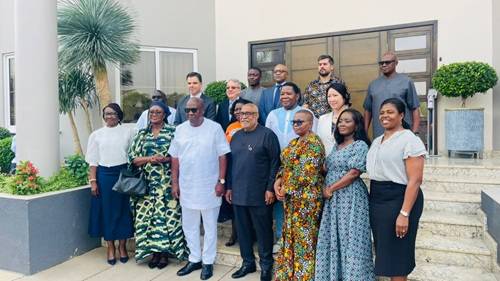President-elect John Dramani Mahama has expressed his intention to renegotiate Ghana’s current agreements with the International Monetary Fund (IMF) and the World Bank, aiming to align them with his administration’s priorities. Speaking during a visit by United Nations Resident Coordinator Charles Abani, Mr. Mahama stressed the need for recalibrated partnerships that reflect the nation’s current realities and aspirations.
He highlighted the critical importance of tailoring these agreements to support Ghana's recovery efforts, emphasizing that his government’s primary focus will be on rebuilding the economy and fostering sustainable growth. According to Mr. Mahama, such adjustments are essential to establishing a solid foundation for collaboration with development partners as the new administration prepares to take office in 2025.
He stated, "This adjustment is crucial and will help put the new government on the same springboard with our development partners to begin the rebuilding of the economy and the country."
Transition Framework Ensures Continuity
Guiding the handover process is the Presidential (Transition) Act, 2012 (Act 845), which mandates the establishment of a Transition Team within 24 hours after the declaration of presidential election results. This legal framework ensures a smooth transition between administrations and sets the stage for effective collaboration with international institutions and other stakeholders.
Mr. Mahama acknowledged the immediate need to engage with the IMF and the World Bank to realign ongoing programs with the priorities of his incoming administration. "Looking at the existing programs, we need to tweak them to meet the realities of today. One of our main concerns is the issue of debt repayments," he said. He emphasized the urgency of smoothing out repayment schedules to avoid another default, describing such an event as catastrophic.
Ghana’s Existing Financial Agreements
Ghana is currently implementing a 36-month, $3 billion Extended Credit Facility (ECF) with the IMF. Additionally, the country has signed various agreements with the World Bank, including a $250 million Ghana Financial Stability Project and another $250 million for the Ghana Energy Sector Recovery Programme. While acknowledging the complexity of the task ahead, Mr. Mahama reaffirmed his commitment to stabilizing the economy and managing debt effectively.
"I don’t kid myself that it is going to be an easy task. It is going to be quite tough," he remarked. "The margin by which we won indicates that Ghanaians have very high expectations, and we will work tirelessly to meet those expectations."
Global Partnerships for Ghana’s Recovery
The president-elect underscored the significance of global collaboration in addressing Ghana’s economic challenges. He praised the United Nations and its agencies for their longstanding support, particularly in areas such as food security.
"We anticipate challenges with food availability, and how we quicken support to ameliorate this situation is something we would like to work on," Mr. Mahama stated. He also expressed readiness to engage with organizations like UNICEF and UNHCR to address the immediate needs of Ghanaians.
UN Commends Ghana’s Democratic Excellence
Charles Abani, the United Nations Resident Coordinator, lauded Ghana’s peaceful and seamless 2024 elections, describing them as a model of democratic excellence in Africa. "This visit is to assure you that the UN stands fully with you and fully with Ghana. We know your presidency is just about to unfold, and I can assure you of our collaboration," Mr. Abani said.
The elections saw Mr. Mahama secure 6,328,397 valid votes, representing 56.55% of the total votes cast. This decisive victory underscores the strong mandate given to him by the Ghanaian electorate.
Strategic Focus on Debt and Economic Stability
Debt repayment remains a top priority for the incoming administration. Mr. Mahama outlined plans to work closely with development partners to manage Ghana’s financial obligations while ensuring economic stability. He stressed the importance of balancing immediate needs with long-term growth objectives.
"We must smooth out the repayment schedules to prevent further defaults and ensure that the economy can recover sustainably," he reiterated.
High Expectations from Ghanaians
Mr. Mahama acknowledged the weight of public expectations following his victory. "The margin of our win shows that Ghanaians believe in our vision for the country. This is a clear indication that they expect real change, and we are committed to delivering that," he affirmed.
A Path Forward for Economic Growth
As Ghana transitions to a new administration, the focus remains on stabilizing the economy and fostering partnerships that reflect the nation's evolving needs. The renegotiation of agreements with the IMF and World Bank will play a crucial role in achieving these objectives. With a clear mandate and a determined approach, the incoming government aims to rebuild Ghana’s economy and restore public confidence.
This collaborative and forward-looking strategy promises to set Ghana on a path to sustainable growth and economic stability, reaffirming its position as a beacon of democracy and resilience in Africa.



No comments yet
Be the first to share your thoughts!